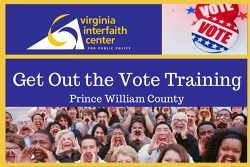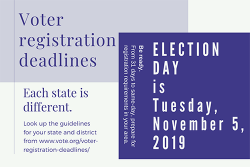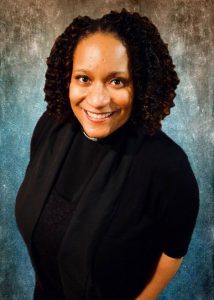United Nations | California | Minnesota | New Mexico | Ohio | Pennsylvania | Southeastern Synod | Washington | Wisconsin
Lutheran Office for World Community, United Nations, New York, N.Y.
Dennis Frado, director
“TIME FOR HARD CHOICES” REPORT LAUNCH: On September 6, 2019, the Dag Hammarskjöld Foundation and the Multi-Partner Trust Fund Office launched a report titled “Financing the UN Development System: Time For Hard Choices.” Split into two sections, part one provides UN funding data on revenue and expenditure, while part two delves into the financial complexities of the 2030 Agenda, told from the perspective of more than 30 authors within and outside the UN system. Read the full report here.
30TH ANNIVERSARY OF THE CONVENTION ON THE RIGHTS OF THE CHILD: UNICEF installed a display of 3,758 backpacks at the UN Headquarters, representing the ”senseless loss of a young life to conflict,” and a “reminder to world leaders of the stakes,” in the lead up to the 30th Anniversary of the Convention on the Rights of the Child on November 20. The 2019 Annual Report of the Secretary General on children and armed conflict states, “more than 12,000 children were killed or maimed in conflict zones last year, the highest number since the UN started monitoring and reporting this grave violation.”
“WOMEN IN POWER” CALL TO ACTION : H.E. Mrs. Maria Fernanda Espinosa Garcés, the 73rd President of the General Assembly, led the final informal high-level event in her “Women in Power” series. The call to action was titled “Voices for Change and Inclusion: Joining Forces and Redoubling Efforts to Achieve Gender Equality and Women’s Empowerment for All,” influenced by Espinosa Garcés’ eight priorities to advance female leadership. During opening remarks, Ms. Susan Malcorra stated, “We are deeply convinced that for peace to be achieved and sustained, the full participation and potential of women must be unleashed.” View the session here. This event is in line with the call for action to accelerate full implementation of the Beijing Declaration and Platform for Action, as we head towards its 25th Anniversary in 2020. Read more here.
: H.E. Mrs. Maria Fernanda Espinosa Garcés, the 73rd President of the General Assembly, led the final informal high-level event in her “Women in Power” series. The call to action was titled “Voices for Change and Inclusion: Joining Forces and Redoubling Efforts to Achieve Gender Equality and Women’s Empowerment for All,” influenced by Espinosa Garcés’ eight priorities to advance female leadership. During opening remarks, Ms. Susan Malcorra stated, “We are deeply convinced that for peace to be achieved and sustained, the full participation and potential of women must be unleashed.” View the session here. This event is in line with the call for action to accelerate full implementation of the Beijing Declaration and Platform for Action, as we head towards its 25th Anniversary in 2020. Read more here.
ANNUAL PRAYER FOR PEACE: In the lead up to the United Nations International Day for Peace (21 September) and the general debate during the 74th Session of the General Assembly, the Permanent Observer Mission of the Holy See to the United Nations hosted its 33rd Annual Prayer for Peace service. Archbishop Bernardito Auza led three prayers by Pope Francis, UN Secretary-General António Guterres spoke of the value of such a service, and His Excellency Tijjani Muhammad-Bande of Nigeria, President of the 74th session of the General Assembly, expressed how ”it is important to seek the help of God in the work of the United Nations.”
LOWC F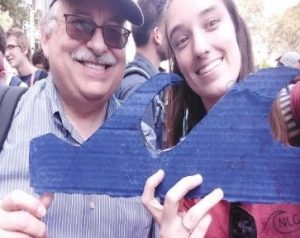 OR CLIMATE JUSTICE: On Friday, September 20, 2019, LOWC staff joined an estimated 60,000+ students, adults and activists in the Climate Strike for climate action in New York. Greta Thunberg delivered a speech during the event in New York stating, “we are doing this to wake leaders up… We are a wave of change, together and united we are unstoppable .” It is estimated that more than 1 million people participated in climate strikes globally across 125 countries on this day.
OR CLIMATE JUSTICE: On Friday, September 20, 2019, LOWC staff joined an estimated 60,000+ students, adults and activists in the Climate Strike for climate action in New York. Greta Thunberg delivered a speech during the event in New York stating, “we are doing this to wake leaders up… We are a wave of change, together and united we are unstoppable .” It is estimated that more than 1 million people participated in climate strikes globally across 125 countries on this day.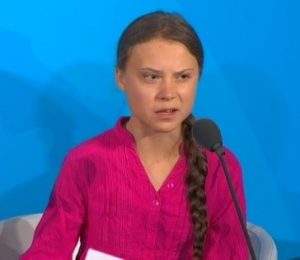
The UN Youth Climate Summit and SDG Action Zone took place the following day (September 21) at the United Nations Headquarters where Greta Thunberg criticized world leaders for their lack of urgency, during the opening session. Young entrepreneurs from around the world were given the opportunity to take the mic and discuss solutions.
On September 22, UN Secretary-General Antonio Guterres convened the Climate Action Summit 2019, where leaders were urged to showcase “concrete, realistic plans to enhance their nationally determined contributions by 2020, in line with reducing greenhouse gas emissions by 45% over the next decade, and to net zero emissions by 2050.” During the event (view here), members of governments, the private sector, civil society and other international organizations came together to develop six action portfolios to curb global greenhouse gas emissions and promote global action.
 74TH GENERAL ASSEMBLY CONVENES: The 74th session of the United Nations General Assembly (UNGA74) began on 17 September with the general debate taking place 24 – 30 September under the new GA President, His Excellency Tijjani Muhammad-Bande of Nigeria. To view what each country had to say during the General Debate, click here. Many other high-level events were held, such as on Universal Health Coverage, the High-level Political Forum on Sustainable Development, financing for development, and the review of progress made in addressing priorities of small island developing states (SIDS) also took place during this time.
74TH GENERAL ASSEMBLY CONVENES: The 74th session of the United Nations General Assembly (UNGA74) began on 17 September with the general debate taking place 24 – 30 September under the new GA President, His Excellency Tijjani Muhammad-Bande of Nigeria. To view what each country had to say during the General Debate, click here. Many other high-level events were held, such as on Universal Health Coverage, the High-level Political Forum on Sustainable Development, financing for development, and the review of progress made in addressing priorities of small island developing states (SIDS) also took place during this time.
California
Regina Q. Banks, Lutheran Office of Public Policy- California (LOPP-CA) lutheranpublicpolicyca.org
LEGISLATURE ADJOURNS: September 13 marked the end of the 2019 legislative year. Governor Gavin Newsome has until October 13, 2019 to sign or veto legislation in his possession. LOPP-CA is eagerly awaiting the final disposition of legislation we have been following this session. Please standby for word on all of our legislative priorities.
CLIMATE EMERGENCY SUMMIT: LOPP-CA had a unique opportunity to engage with faith leaders across the world and spanning numerous traditions at the Climate Emergency Summit hosted by ELCA Advocacy in New York, NY. The summit was an extension of the United Nations General Assembly and provided an opportunity to turn a faith-based lens to the work of climate justice in our world.
HUNGER FELLOW WELCOME: LOPP-CA is pleased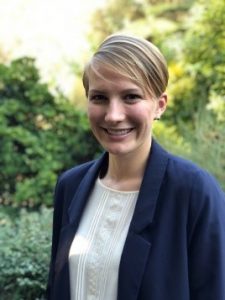 to welcome Ms. Nicole Newell to our office as the 2019-2020 California Hunger Advocacy Fellow. Nicole Newell joins this year’s ELCA Hunger Advocacy Fellows with a background in non-profit work, advocacy and teaching, both domestically and abroad. Her focus on food justice has led her to work in kitchens and on small-scale farms to develop context for sustainable food practices. With a BA in Practicing Theology from St. Olaf College, Nicole has a love for Lutherans and served with Lutheran Volunteer Corps in Washington, DC from 2015-2016. She grew up in Des Moines, IA but was born in Sacramento. Nicole is eager to bring her passion for the intersections of faith and justice to effect policy-level change in California. Please look for ways to invite Nicole into your policy ministries.
to welcome Ms. Nicole Newell to our office as the 2019-2020 California Hunger Advocacy Fellow. Nicole Newell joins this year’s ELCA Hunger Advocacy Fellows with a background in non-profit work, advocacy and teaching, both domestically and abroad. Her focus on food justice has led her to work in kitchens and on small-scale farms to develop context for sustainable food practices. With a BA in Practicing Theology from St. Olaf College, Nicole has a love for Lutherans and served with Lutheran Volunteer Corps in Washington, DC from 2015-2016. She grew up in Des Moines, IA but was born in Sacramento. Nicole is eager to bring her passion for the intersections of faith and justice to effect policy-level change in California. Please look for ways to invite Nicole into your policy ministries.
SYNODICAL AND CONGREGATION VISIT THANK YOUS: A sincere “Thank You” goes out to the pastors and members of Shepherd of the Valley Lutheran in Simi Valley for their warm welcome this month. This congregation made a special effort to include Advocacy in their “Gods Work. Our Hands.” Day of Service observance, and it was truly special. Please consider adding an advocacy component to this and other special occasions in your ministry.
Similarly, Sierra Pacific Women of the ELCA offered a warm and sisterly welcome to their annual retreat September 18-20 at the beautiful Bishop’s Ranch retreat center in Healdsburg, CA. The majestic scenery was a great backdrop for worship, work and rejuvenation. Congratulations to the new board of SPWELCA, and we at LOPP-CA look forward to working together closely.
Minnesota
Tammy Walhof, Lutheran Advocacy- Minnesota (LA-MN) lutheranadvocacymn.org
IMMIGRATION: There is a great deal of interest in immigration issues across the state. Several congregations and synod groups are becoming more engaged with the ELCA AMMPARO Program, and considering what welcome and partnership with asylum seekers and refugees should mean in their context. This is increasing interest in LA-MN’s work on policy issues and raising lots of questions about the intricacies of US immigration programs. In addition to the Migrant Monday posts on Facebook, Tammy (LA-MN director) did immigration forums three times in September and will be doing similar programs in October and November.
MINNESOTA ENVIRONMENTAL PARTNERSHIP (MEP): Lutheran Advocacy-MN works with many partners and coalitions. One of those coalitions, made up of around 80 organizations, is MEP. Tammy served for two years as the co-chair of the MEP Energy & Climate Cluster and has been working with MEP staff and partners in finding ways to restructure the work to be more impactful. In early September, she was part of a small group of member organizations proposing that MEP take on Climate Change as its one main marquee issue, since most every other issue fits under that big umbrella. The proposal was accepted unanimously by members. This will allow the various clusters or issue groups to collaborate better on messaging with both the public and with legislators, and it should help move groups out of singular silos of interest, even while allowing support for legislation in the various areas of member organization expertise. Lutheran Advocacy-MN expects to continue efforts on clean energy, but we look forward to broader collaboration on other parts of the climate crisis. Watch for more information to come as we develop the MEP detailed legislative agenda over the next couple of months.
HOMES FOR ALL COALITION: Although there is still much left to accomplish from the bold Homes for All biennium agenda created last year, the policy team (where LA-MN is an active participant) is in the process of considering whether changes or additions need to be made. One of the partners has been meeting with Tammy and other key partners on eviction policy concerns that will be proposed as additions to the agenda in mid-October.
GUSTAVUS NOBEL FORUM: The Nobel Forum at Gustavus Adolphus College was called “Climate Changed: Facing our Future.” We’re glad that many LA-MN advocates were able to listen to world-renown scientists and speakers by LiveStream or in person. Those presentations and panels are now available on the Gustavus YouTube Channel at https://tinyurl.com/y6xyhxhs.
at Gustavus Adolphus College was called “Climate Changed: Facing our Future.” We’re glad that many LA-MN advocates were able to listen to world-renown scientists and speakers by LiveStream or in person. Those presentations and panels are now available on the Gustavus YouTube Channel at https://tinyurl.com/y6xyhxhs.
New Mexico
Ruth Hoffman, Lutheran Advocacy Ministry—New Mexico (LAM-NM) lutheranadvocacynm.org
CONGRE GATIONS BUILD RELATIONSHIPS: All Saints Lutheran Church in Albuquerque spearheaded the organizing of a gathering of advocates from the ELCA congregations on the west side of Albuquerque. State legislators representing the west side were invited to the event which also involved Cross of Hope Lutheran Church and Community of Joy Lutheran Church. Six legislators attended and spoke at the gathering on Septem
GATIONS BUILD RELATIONSHIPS: All Saints Lutheran Church in Albuquerque spearheaded the organizing of a gathering of advocates from the ELCA congregations on the west side of Albuquerque. State legislators representing the west side were invited to the event which also involved Cross of Hope Lutheran Church and Community of Joy Lutheran Church. Six legislators attended and spoke at the gathering on Septem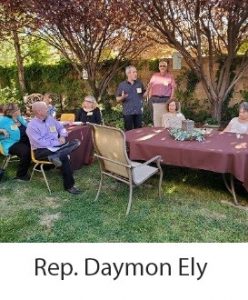 ber 22. Representatives from our ecumenical partners of St. Francis Episcopal Church and Holy Rosary Roman Catholic Community also attended. Advocates expressed their appreciation for the work that legislators do, and legislators learned about LAM-NM priorities.
ber 22. Representatives from our ecumenical partners of St. Francis Episcopal Church and Holy Rosary Roman Catholic Community also attended. Advocates expressed their appreciation for the work that legislators do, and legislators learned about LAM-NM priorities.
Ohio
Nick Bates, Hunger Network in Ohio hungernetohio.com
DAYTON CONGREGATION JUMPS INTO ADVOCACY WITH PASSION: North Riverdale Lutheran Church is responding with the gospel in face of tragedy. On August 4th, a gunman opened fire at 1:00 in the morning in the Oregon Entertainment District of Dayton – just a few miles from the church. Congregation member Brien Dyer told the Columbus Dis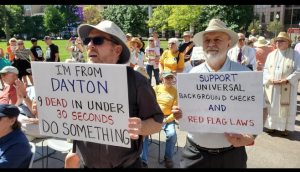 patch, “I was watching a movie when he heard a faint ‘pop, pop, pop, pop’ shortly after 1 a.m.” Dyer and Pastor Monte Stevens joined 150 people in Columbus for a rally on September 18th to call on the Ohio legislature to “DO SOMETHING” – a phrase that was popularized the day after the shooting and is the name of their new congregational advocacy team. During a vigil, Governor Mike DeWine was shouted down by attendees with the refrain to “do something,” and it has inspired many people in the area to get involved with advocacy over the past few weeks.
patch, “I was watching a movie when he heard a faint ‘pop, pop, pop, pop’ shortly after 1 a.m.” Dyer and Pastor Monte Stevens joined 150 people in Columbus for a rally on September 18th to call on the Ohio legislature to “DO SOMETHING” – a phrase that was popularized the day after the shooting and is the name of their new congregational advocacy team. During a vigil, Governor Mike DeWine was shouted down by attendees with the refrain to “do something,” and it has inspired many people in the area to get involved with advocacy over the past few weeks.
North Riverdale’s newly formed committee with more than 12 active members is discussing best practices for phone calls, letters to the newspaper, and how to have effective meetings with legislators. Pastor Monte is also connecting with clergy groups that have met with Governor DeWine to discuss these issues. Our ELCA state public policy office in Ohio has offered guidance and support to their work. Through partnership with each other, policy and community experts, and legislative leaders, we can solve the issues impacting our community.
While many of our congregations begin with issues related to hunger, the Hunger Network in Ohio doesn’t end there. HNO works on a wide variety of issues, including immigration, community safety, education, racial justice and much more. We have our faith advocacy guidebook available online to assist congregations in starting their own advocacy teams!
SAVE THE DATE: The Hunger Network in Ohio is partnering with Faith in Public-Ohio to host a Facebook Live event about what sanctuary means for Lutherans in Ohio – tentatively scheduled for the evening of Tuesday October 29th. More details to come!
Pennsylvania
Tracey DePasquale, Lutheran Advocacy Ministry–Pennsylvania (LAMPa) lutheranadvocacypa.org
ELCA CONGREGATIONS LIFT THEIR VOICES: “Than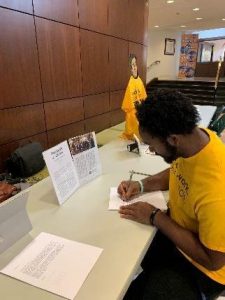 k you Lutheran Advocacy Ministry in Pennsylvania for pointing Union Lutheran in York towards the excellent church wide resources for ‘God’s Work. Our Hands.’ Sunday!” wrote Vicar Carla Christopher of Union Lutheran Church in York. “Our letters on creation care and disaster relief mailed this morning!” Learn more.
k you Lutheran Advocacy Ministry in Pennsylvania for pointing Union Lutheran in York towards the excellent church wide resources for ‘God’s Work. Our Hands.’ Sunday!” wrote Vicar Carla Christopher of Union Lutheran Church in York. “Our letters on creation care and disaster relief mailed this morning!” Learn more.
LAMPA POLICY COUNCIL SHARES ANNUAL RETREAT: LAMPa  Policy Council recently gathered for their annual retreat. The group engaged in discernment about strategic direction as policy council to support LAMPa’s mission and to foster being a church in the public square. Their work built upon responses to a statewide survey of Pennsylvania ELCA rostered leaders and LAMPa’s advocacy network. The survey showed that striving for justice and peace and care for creation rank high in leaders’ sense of call and discipleship. It also identified barriers and opportunities for building greater capacity to live into that call. After hunger and poverty, which will always be at the core of LAMPa’s work, respondents listed gun violence, climate change/environmental stewardship and standing for welcome for migrants as top priorities for advocacy. Read more.
Policy Council recently gathered for their annual retreat. The group engaged in discernment about strategic direction as policy council to support LAMPa’s mission and to foster being a church in the public square. Their work built upon responses to a statewide survey of Pennsylvania ELCA rostered leaders and LAMPa’s advocacy network. The survey showed that striving for justice and peace and care for creation rank high in leaders’ sense of call and discipleship. It also identified barriers and opportunities for building greater capacity to live into that call. After hunger and poverty, which will always be at the core of LAMPa’s work, respondents listed gun violence, climate change/environmental stewardship and standing for welcome for migrants as top priorities for advocacy. Read more.
CONCERNS WILL ENERGIZE PA LEGISLATION: LAMPa’s creation care advocates spoke out against “Energize PA” that touts itself as a pro-growth, pro-jobs legislative package that will create jobs and redevelop infrastructure with no new fees or taxes, but which strips protections for the environment and the health of Pennsylvanians and our neighbors far and wide.
STAFF ATTENDS ULS FALL CONVOCATION  AND THE ANNUAL CAPITOL ALL-STARS BALLGAME: Tracey and Lynn attended the United Lutheran Seminary (ULS) Fall Convocation on the Philadelphia campus. The theme was: A Christian Response to Rising Violence in the World. ELCA Director of Advocacy, the Rev. Amy Reumann, was the keynote presenter. It was a welcome opportunity to connect ULS staff and alumni. In a show of support for our partners in the Pa. Hunger Action Coalition and encouragement for legislative support of anti-hunger programs, staff also attended the annual Capitol All-Stars Ballgame that benefits Pennsylvania Food Banks. Team Youse (eastern PA) outpaced Team Yinz (western PA) 16-3, breaking a three-year streak of Yinz dominance.
AND THE ANNUAL CAPITOL ALL-STARS BALLGAME: Tracey and Lynn attended the United Lutheran Seminary (ULS) Fall Convocation on the Philadelphia campus. The theme was: A Christian Response to Rising Violence in the World. ELCA Director of Advocacy, the Rev. Amy Reumann, was the keynote presenter. It was a welcome opportunity to connect ULS staff and alumni. In a show of support for our partners in the Pa. Hunger Action Coalition and encouragement for legislative support of anti-hunger programs, staff also attended the annual Capitol All-Stars Ballgame that benefits Pennsylvania Food Banks. Team Youse (eastern PA) outpaced Team Yinz (western PA) 16-3, breaking a three-year streak of Yinz dominance.
Southeastern Synod
Hilton Austin, Southeastern Synod advocacy team
CRIMINAL JUSTICE REFORM: We have signed on as co-sponsors of The Second Chance Act along with Georgia Justice Project and Georgia Interfaith Public Policy Center. GJP is currently looking for the best sponsor for a bill they are drafting. “As the time gets closer, we will have specific targets. This fall, I think we will focus more broadly on public education through letters to the editors, calling your own legislator, calling your own elected prosecutors and as the session approaches or starts, we may shift to calling the Judiciary committees,” said Ann Colloton, GJP Policy and Outreach Coordinator.
IMMIGRATION: Iglesia Luterana Augustina de Guatemala had their seco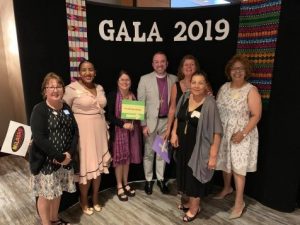 nd annual ‘Milagro Gala’ on September 7th.
nd annual ‘Milagro Gala’ on September 7th.
MILAGRO VISION: Rural women will attend the MILAGRO Women’s Education Center to continue their education and develop a wide range of skills vital to a future of improved daily living. Utilizing these skills, the women will be empowered to return to their communities to start a sustainable business, to serve as leaders and examples to be followed in their churches, community and family, and they will serve as teachers for future generations of young women and girls.
WOMEN OF THE ELCA: Policy Council member Dawn Bennett and myself did workshops at our synod’s Women of the ELCA convention. We also had an advocacy exhibit; the women have been very involved in the battle to end human trafficking. Southeastern Synod Advocacy was also the recipient of their Love Offering this year. Ladies, thank you for your presence and generosity.
DOMESTIC HUNGER GRANT REVIEWS: This was a very enlightening adventure. The Grant Review Team had the opportunity to speak with nine ministries across the synod and hear about some exciting ministries supporting those dealing with poverty in their communities. I only wish we had the resources to fulfill all of their visions.
Washington
Paul Benz, Faith Action Network (FAN) fanwa.org
FALL CLUSTER GATHERINGS: Eve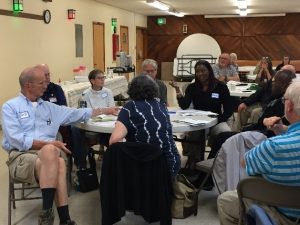 ry fall, FAN convenes our geographic clusters of our 153 Network of Advocating Faith Communities all around our state to listen to what’s going on in each of these areas, share what FAN staff are working on, and sometimes hear from a local state legislator. These meetings will run from mid-September through mid-November. Cluster Gathering details can be found at http://fanwa.org/our-network/cluster-meetings/.
ry fall, FAN convenes our geographic clusters of our 153 Network of Advocating Faith Communities all around our state to listen to what’s going on in each of these areas, share what FAN staff are working on, and sometimes hear from a local state legislator. These meetings will run from mid-September through mid-November. Cluster Gathering details can be found at http://fanwa.org/our-network/cluster-meetings/.
CANDIDATE FORUMS: This fall, FAN is engaged in five candidate forums – four city council (Bellevue, Federal Way, SeaTac, and Seattle) and one county sheriff’s race – on the topic of police accountability in Snohomish County. These forums are co-sponsored by many of our faith, community and policy partners. The flyers for these events can be found at fanwa.org/calendar.
INTERIM ELECTED OFFICIAL MEETINGS: FAN is scheduling and participating in many meetings with elected officials (primarily state legislators) on bills that are still alive for the 2020 legislative session, as well as seeing what new bills our partners and legislators will be introducing in January.
ANNUAL FUNDRAISING DINNER: FAN’s Annual Dinner will be o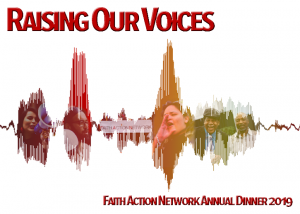 n Sunday, Nov. 10 with the theme “Raising Our Voices.” ELCA member, travel guru, and social justice advocate and philanthropist Rick Steves will be present. This is always a great end of the year event for our progressive faith communities to celebrate our wins, be strengthened for the coming year, and hear about FAN’s 2020 legislative agenda. See more at fanwa.org/annual-dinner.
n Sunday, Nov. 10 with the theme “Raising Our Voices.” ELCA member, travel guru, and social justice advocate and philanthropist Rick Steves will be present. This is always a great end of the year event for our progressive faith communities to celebrate our wins, be strengthened for the coming year, and hear about FAN’s 2020 legislative agenda. See more at fanwa.org/annual-dinner.
Wisconsin
Cindy Crane, Lutheran Office for Public Policy in Wisconsin (LOPPW) loppw.org
LOPPW WELCOMES AMELIA GONZALES: Am elia joins LOPPW as a graduate student in social work at UW-Madison. She comes to us via the university’s 4W-STREETS (Social Transformation to End the Sexual Exploitation and Trafficking for Sex) program. Amelia is a recent graduate in social work and sociology from UW Oshkosh. She will be with LOPPW for 18 hours per week for the first semester.
elia joins LOPPW as a graduate student in social work at UW-Madison. She comes to us via the university’s 4W-STREETS (Social Transformation to End the Sexual Exploitation and Trafficking for Sex) program. Amelia is a recent graduate in social work and sociology from UW Oshkosh. She will be with LOPPW for 18 hours per week for the first semester.
CARE FOR GOD’S CREATION: The director spoke at an interfaith gathering on the day of the Climate Strike and set up a table with an LOPPW Advisory Council member at the rally. The Care for God’s Creation team also met and discussed holding an event that highlighted renewable energy and would include advocacy.
HUMAN 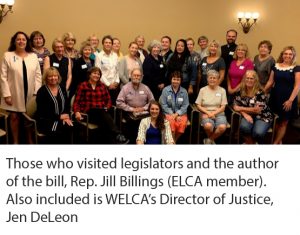 TRAFFICKING: LOPPW and Women of the ELCA from the East-Central synod, the Northwest Synod and South-Central Synod organized a rally on September 24. LOPPW and Women of the ELCA supporters from five synods were in attendance.
TRAFFICKING: LOPPW and Women of the ELCA from the East-Central synod, the Northwest Synod and South-Central Synod organized a rally on September 24. LOPPW and Women of the ELCA supporters from five synods were in attendance.
IMMIGRATION: LOPPW’s director consulted with a congregation interested in starting an immigration task force. She was also in dialogue with members of two other synods on addressing immigration in congregations.
SNAP: Via one message to our list serve and social media we encouraged people to comment on the new proposed rule for the Supplemental Nutrition Assistance Program.
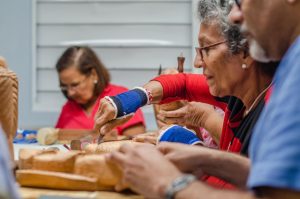 IntegrArte, a ministry hosted in an ELCA congregation in Dorado, Puerto Rico, works with people of all ages to address mental health in a community where mental health services are otherwise inaccessible to many who need them, particularly in the aftermath of Hurricanes Irma and Maria. IntegrArte is building connections between church and community by expanding mental health services within the greater community. IntegrArte is preparing to realize its long-term dream of expanding into a community center that will host programming for older adults, a Montessori school and an emergency shelter.
IntegrArte, a ministry hosted in an ELCA congregation in Dorado, Puerto Rico, works with people of all ages to address mental health in a community where mental health services are otherwise inaccessible to many who need them, particularly in the aftermath of Hurricanes Irma and Maria. IntegrArte is building connections between church and community by expanding mental health services within the greater community. IntegrArte is preparing to realize its long-term dream of expanding into a community center that will host programming for older adults, a Montessori school and an emergency shelter.

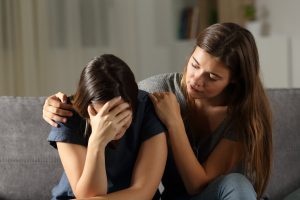


















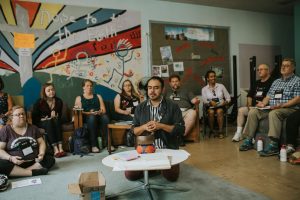
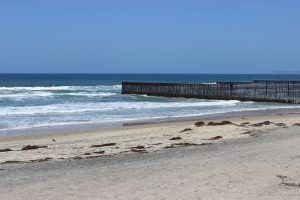 Directors for Evangelical Mission:
Directors for Evangelical Mission:
